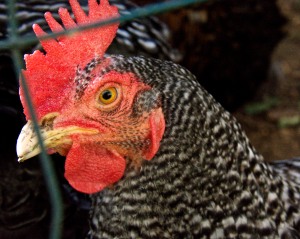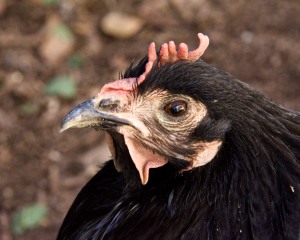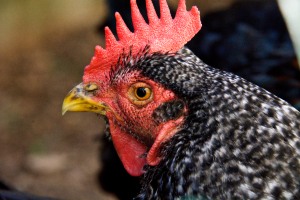I have sad news to report. My favorite hen, Henrietta the Black Australorp, has passed away at the age of 8 years. She hadn’t changed into the normal red, swollen comb and wattle of spring, so I knew her estrogen levels weren’t normal. I thought maybe she was going through “henopause.”
But then she quit eating and became listless. She perked up for a couple of days, but then she went off her feed again. She didn’t come out of the coop one morning last week. She was the only one still sleeping in the coop. The other four hens preferred roosts in the enclosed run for their sleeping quarters. Henrietta was old and preferred the indoor shelter of the coop.
Henrietta was hunkered down, alive but not moving. I petted her and left her alone. I checked an hour later, and two other hens were with her. One was gently grooming her neck feathers. Another hour passed, and so had Henrietta. I buried her under my fruit trees and put a paving stone on top to keep the night critters from digging her up.
She was my favorite hen because she was the only one that let me pet her. I have since learned that the Black Australorp was developed in Australia from the Orpington Breed. Orpingtons are known for their docility. I thought I wanted to replace Henrietta with a Buff Orpington, because they are the best pet breed. But they don’t lay as well as other breeds and tend to go broody. Also, other chickens tend to pick on the Buff Orpingtons because they are so docile. On the other hand, the Black Australorps are great layers, and are docile and friendly as well.

This is a different Barred Rock. Her upper beak is a bit short in comparison. No, I don’t trim their beaks. At some factory farms, the chickens have their upper beaks cut part way off to keep the birds from pecking each other. They peck because they’re over-crowded and stressed.
Since the rest of my flock is three Barred Rocks and one Black Sex-linked (cross between a Rhode Island Red and Barred Rock), I think I will seek out more Black Australorps. But not just yet. Even though my two youngest hens will be three in July, egg production has picked up after the winter hiatus. We are getting all the eggs we need for now. Frankly, Henrietta wasn’t pulling her weight in the egg-laying department the last couple of years anyway. Hens enjoy an unlimited vacation and retirement package here on our urban mini-farm, especially friendly hens that let our grandkids hold them. On factory farms, the entire flock is slaughtered at age two when egg production slows down. They have to do that to keep their operation cost effective. I have the luxury of letting my chickens enjoy full lives.

This is my current flock. Chicken Little (age 7) is the Black Sex-linked. The Barred Rocks are Miss Hillary (age 5, on the right), Peep, and Cheep (almost 3). Miss Hillary needs a nail trim.
I really enjoy having my own hens. I know that the eggs I eat were laid by hens that have plenty of room to move and flap their wings, lots of sunshine, and nutritious food, plus scratch and organic greens to keep them busy. They have ample pine shavings in their coop to keep it smelling nice. No ammonia build-up or stressed out birds in my flock. And no battery cages. My girls get to scratch in the dirt and duff. I even toss autumn leaves in their run to give them more to dig through. Chickens love to look for their food. It gives them something to do other than peck each other. Nothing but happy hens in my little flock.





Lou, I am so sorry to hear of Henrietta’s passing. Is she the one you leashed and walked? Tonie
LikeLike
Yes, Tonie. Henrietta was so docile that she would wear a harness and let us walk her on a leash. Am I a crazy lady or what?
LikeLike
So sorry to hear the bad news. It’s so hard to lose an animal friend. It sounds like Henrietta had a good life, all your girls have it good.
LikeLike
Michelle, I feel good that Henrietta had a full and happy life. She had plenty of room and good food, some of it organic. But I loved her more than she loved me.
LikeLike
I too am sorry to learn the sad news. It’s always difficult to lose a love one.
LikeLike
Thanks, Norma. It is much easier to lose a chicken than a pet cat or dog. But it still caused me some grief.
LikeLike
Thank you for describing how Henrietta died
I’m glad Henrietta had a peaceful and natural death after eight years! What a lucky chicken! I’m just now getting eggs from my two chickens. It’s amazing how thrilling those first eggs are. Already have worried about what to do when they get old or sick. Your story helped a lot.
I have an australoop–she is gold and brown, a very pretty chicken, and she lays light beige eggs. The other is a barred rock like yours. They both lay an egg nearly every day, but the Australoup skips more days than the barred rock. And the barred rock is more docile than the Australoup. There are times when they will both let me pet them, but neither will settle down in my lap. I also appreciate knowing that my eggs come from happy, healthy chickens–mine have the run of the yard for a good part of the day. They scratch it up pretty thoroughly, but I have trained them to stay off the patio (due to the poo), although if they want something, they will walk onto the patio and tap at my patio doors. They are very sisterly, and extremely concerned for each other.
LikeLike
HB Farmer, I am so happy to know that there are other chicken farmers in town. If your chickens are laying almost everyday, they must be young. You might want to add to your flock next year or the year after to keep some birds “in the loop.”
LikeLike
Sorry about the sad news, thanks for sharing Henrietta’s life story.
LikeLike
Thanks, Mac. I miss Henrietta, but the other hens are laying nicely at present.
LikeLike
Oops! I just discovered an error in my previous comment under “Farewell to Henrietta.” I don’t have an Australoop. My pretty gold and brown chicken is an Araucana. You are right, my two chickens are young–just a year old. During these hot days in March (??), when I let them out of the coop, they find a shady spot under a bush and dig down to the moist, cool soil and sit together, chatting and resting.
(Lou, note my new e-mail address.)
LikeLike
HB Farmer, where do you get your hens? Are you raising them from chicks yourself? My hens really enjoyed their dust baths during our 90 degree heat blast weather.
LikeLike
My son-in-law got them, as new chicks, at the feed store in Midway City. I don’t know the name of it, but it has been there forever. We also buy feed and other supplies there. Do you know of another place?
Prior to the hens, he bought a half-dozen eggs from a Vietnamese woman he found online. He wanted his kids to see them hatch. (He had access to an incubator.) Only two hatched, and they did it during the night when everyone was asleep. They turned out to be white Leghorn roosters.
We raised them to near maturity-long enough for us city slickers to determine that they were male-and then they went off to Auntie’s house in a rural area. (Pre-arrangements had been made, just in case.) Compared to the hens, the roosters were louder, more destructive, ate more, and ate faster. They were also far more aggressive than the hens are-constantly challenging each other for dominance, but still remaining close companions. By the time they left, I had had enough of testosterone for a long while.
And, oops again! It’s Black Australorp, not Australoop-after Orpington I presume. I get it now. I’m due for cataract surgery soon. Maybe that will help, though I kind of doubt it.
Your garden is AWESOME. What is your soil recipe for the planters? Do you use the chicken manure fresh, or let it dry and set for awhile?
_____
LikeLike
Carleen, I am way behind on replying to my blog comments. Sorry. I got baby chicks at Midway City as well. The place is the Midway City Feed Store. I have bought mature hens from a farmer in San Diego. I may try to get laying hens from other sources, assuming I can find them, as the farmer in San Diego charged $25 a hen. As for the soil for my raised beds, it is a mix of homemade compost (which is where I put the chicken manure–it needs to be composted prior to use in a garden bed), and Miracle Gro Moisture Controlled Potting Soil and Miracle Gro Garden Soil. So it isn’t a 100% organic garden soil mix.
LikeLike
Thank you for the reply Lou. Would you mind sending me an email directly so that I can email you back privately? And–don’t buy laying hens yet!
LikeLike
HB Farmer, I did send you an email. For now, my four hens are all laying so I don’t need any new girls for now. I have one dominant hen that I raised from a chick and she hates me. She pecks me whenever she gets a chance. If I were going to eat one of them (which I’m not), it would be her. She is an unpleasant hen. She is also the largest, so I suspect she is beating the others to the treats like bits of meat or worms.
LikeLike